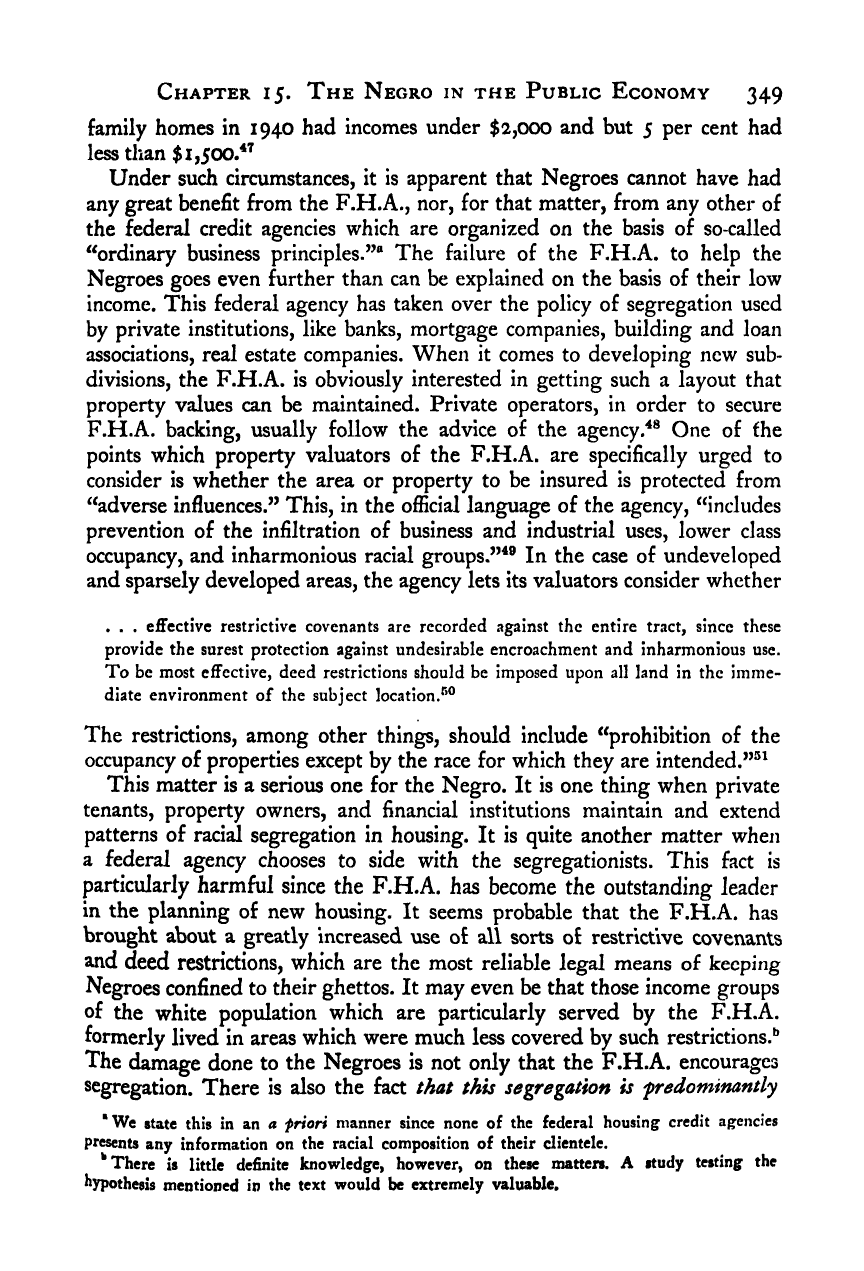Note: Gunnar Myrdal died in 1987, less than 70 years ago. Therefore, this work is protected by copyright, restricting your legal rights to reproduce it. However, you are welcome to view it on screen, as you do now. Read more about copyright.
Full resolution (TIFF) - On this page / på denna sida - IV. Economics - 15. The Negro in the Public Economy - 6. Public Housing Policies

<< prev. page << föreg. sida << >> nästa sida >> next page >>
Below is the raw OCR text
from the above scanned image.
Do you see an error? Proofread the page now!
Här nedan syns maskintolkade texten från faksimilbilden ovan.
Ser du något fel? Korrekturläs sidan nu!
This page has never been proofread. / Denna sida har aldrig korrekturlästs.
Chapter 15. The Negro in the Public Economy 349
family homes in 1940 had incomes under $2,000 and but 5 per cent had
less than $1,500.^^
Under such circumstances, it is apparent that Negroes cannot have had
any great benefit from the F.H.A., nor, for that matter, from any other of
the federal credit agencies which are organized on the basis of so-called
"ordinary business principles.”® The failure of the F.H.A. to help the
Negroes goes even further than can be explained on the basis of their low
income. This federal agency has taken over the policy of segregation used
by private institutions, like banks, mortgage companies, building and loan
associations, real estate companies. When it comes to developing new sub-
divisions, the F.H.A. is obviously interested in getting such a layout that
property values can be maintained. Private operators, in order to secure
F.H.A. backing, usually follow the advice of the agency.’*® One of fhe
points which property valuators of the F.H.A. are specifically urged to
consider is whether the area or property to be insured is protected from
"adverse influences.” This, in the oflicial language of the agency, "includes
prevention of the infiltration of business and industrial uses, lower class
occupancy, and inharmonious racial groups.”^® In the case of undeveloped
and sparsely developed areas, the agency lets its valuators consider whether
. . . effective restrictive covenants are recorded against the entire tract, since these
provide the surest protection against undesirable encroachment and inharmonious use.
To be most effective, deed restrictions should be imposed upon all land in the imme-
diate environment of the subject location/*®
The restrictions, among other things, should include "prohibition of the
occupancy of properties except by the race for which they are intended.”®*
This matter is a serious one for the Negro. It is one thing when private
tenants, property owners, and financial institutions maintain and extend
patterns of racial segregation in housing. It is quite another matter when
a federal agency chooses to side with the segregationists. This fact is
particularly harmful since the F.H.A. has become the outstanding leader
in the planning of new housing. It seems probable that the F.H.A. has
brought about a greatly increased use of all sorts of restrictive covenants
and deed restrictions, which are the most reliable legal means of keeping
Negroes confined to their ghettos. It may even be that those income groups
of the white population which are particularly served by the F.H.A.
formerly lived in areas which were much less covered by such restrictions.**
The damage done to the Negroes is not only that the F.H.A. encourages
segregation. There is also the fact that this segregation is ’predominantly
*We state this in an a ’Priori manner since none of the federal housing credit agencies
presents any information on the racial composition of their clientele.
**
There is little definite knowledge, however, on these matters. A study testing the
hypothesis mentioned in the text would be extremely valuable.
<< prev. page << föreg. sida << >> nästa sida >> next page >>